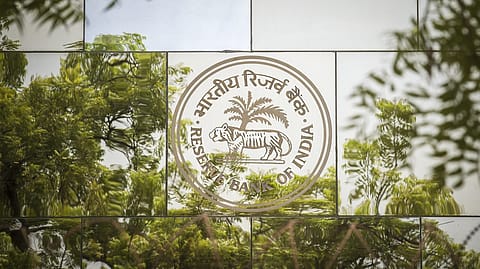RBI hikes repo rate by 40 bps in surprise MPC meet
The monetary panel has decided to retain its accommodative stance from its meeting in April, with an eye accommodation withdrawal.

The Reserve Bank of India (RBI) has hiked key policy rates by 40 basis points with immediate effect through unanimous decision at an off-cycle meeting of the Monetary Policy Committee (MPC) on May 2 and 4. The monetary panel has decided to retain its accommodative stance from its meeting in April, with an eye accommodation withdrawal, RBI governor Shaktikanta Das mentioned in an unscheduled announcement.
After the rate hike, which came after maintaining the status quo for 11 MPC meetings, the repo rate now stands at 4.40%. The standing deposit facility (SDF) rate now stands adjusted to 4.15% and the marginal standing facility (MSF) rate and bank rate to 4.65%, Das said.
"The MPC also decided to unanimously remain accommodative while focussing on withdrawal of accommodation to ensure that inflation remains within the target going forward while supporting growth," the RBI chief further mentioned.
In its last meeting held from April 6-8, the MPC had kept the policy rates unchanged even as inflation reached an eight-month high. RBI had rolled out SDF to suck out excess liquidity in the system injected as a result of its measures to drive growth in the wake of Covid-19-led disruptions.
As per the monetary policy statement after the latest MPC meet, overall system liquidity remained in large surplus. Bank credit rose 11.1% year-on-year as on April 22, 2022. Meanwhile, India’s foreign exchange reserves declined by $6.9 billion in 2022-23 to $600.4 billion during this period.
Elaborating on the MPC's rationale to hike policy rates, Das mentioned that globally inflation is rising alarmingly and spreading fast. "Geopolitical tensions are ratcheting up inflation to their highest levels in the last three to four decades in major economies while moderating external demand. Global crude prices are ruling above ₹100 per barrel and they remain volatile. Global food prices touched a new record in March and have firmed up even further since then," he pointed out.
"Inflation-sensitive items relevant to India such as edible oils are facing shortages due to conflict in Europe and export ban by key producers. The jump in fertiliser prices and other input costs has a direct impact on food prices in India. Further, the normalisation of monetary policy in major advanced economies is now expected to gain pace significantly — both in terms of rate increases and unwinding of quantitative easing as well as rollout of quantitative tightening," he added.
Recommended Stories
In March 2022, headline CPI inflation surged to 7.0% from 6.1% in February, largely reflecting the impact of geopolitical spillovers. Food inflation increased by 154 basis points to 7.5% and core inflation rose by 54 bps to 6.4%.
Several countries have already increased policy rates as inflationary pressures grow, driving commodity prices significantly upwards.
While growing inflation pose a grave threat to emerging economies, rising Covid-19 cases are likely to further exacerbate supply chain bottlenecks while depressing growth, Das warned.
"These dynamics pose upside risks to India’s inflation trajectory set out in the MPC resolution of April 2022," he stated.
(INR CR)
Meanwhile, domestic economic activity is progressing broadly as expected in April with contact-intensive services benefitting from pent-up demand and green shoots in investment activity. The MPC is of the belief that inflation outlook requires "an appropriate and timely response through resolute and calibrated steps".
"In the MPC’s view, monetary policy response at this juncture would help to preserve macro-financial stability amidst increasing volatility in financial markets. Accordingly, the MPC decided to increase the policy repo rate by 40 basis points in its meeting today; it also decided to remain accommodative while focusing on withdrawal of accommodation to ensure that inflation remains within the target going forward, while supporting growth," Das stated.
"The hike in the repo rate has been announced to mitigate the results of spiking inflation rates in the economy. As the RBI announces withdrawal of its accommodative stance, this move might hint at the RBI's willingness to further tighten the liquidity in the forthcoming time. The long term impact of this rate hike across markets shall be an interesting sight," says Shivam Bajaj, founder and CEO at Avener Capital.
"If the Russia-Ukraine war persists beyond May and June, more rate hikes will be needed. If there is an early end to the war (within the next 5-6 weeks), global inflationary pressures will ease, reducing pressure for further rate hikes," says Prasenjit Basu, chief economist at ICICI Securities.
The surprise rate hike spooked markets, as BSE Sensex tanked 1,306.96 points to 55,669.03, Nifty 50 closed 391.50 points lower at 16,677.60.
"The markets have obviously been taken by surprise, and the 10 year benchmark g-sec yield jumped intra-day to 7.40%. Given the enhanced government borrowing calendar this year, RBI has a tough job at hand, to manage the market's expectations of yields while seeing the weekly auctions through in a non-disruptive manner," says Unmesh Kulkarni, managing director senior advisor at Julius Baer India.